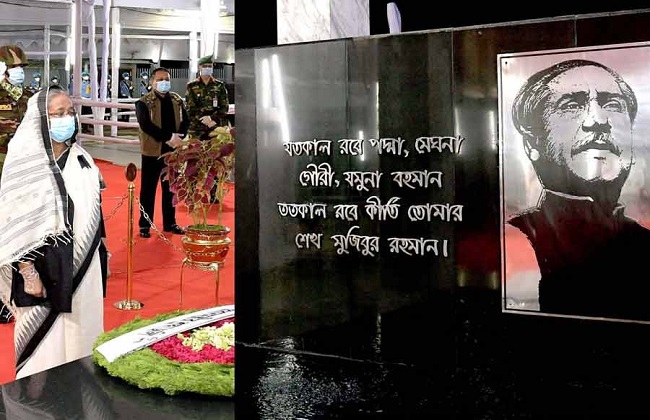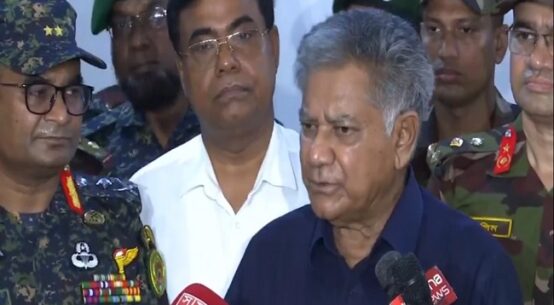
The nation on Sunday observed the National Mourning Day, the darkest chapter in the history of Bangladesh.
Prime minister Sheikh Hasina paid rich tributes to Father of the Nation Bangabandhu Sheikh Mujibur Rahman, marking the 46th anniversary of his martyrdom and the National Mourning Day on Sunday.
The prime minister paid homage to the Architect of the Independence by placing wreaths at his portrait in front of Bangabandhu Memorial Museum at city’s Dhanmondi Road No 32.
After placing wreaths, the premier stood in solemn silence there for some time showing respect to the great leader and the great architect of Bangladesh’s independence.
A smartly turned out contingent of Bangladesh Armed Forces gave a state salute, while bugle played the tune of grief and somber to the last post.
A munajat was also offered seeking the eternal peace of the departed souls of the August 15 carnage.
From Dhanmondi, the prime minister went to Banani Graveyard where her mother Bangamata Begum Fazilatun Nesa Mujib, brothers Sheikh Kamal, Sheikh Jamal and Sheikh Russell, and other martyrs of August 15 were laid to eternal rest.
The prime minister placed wreaths and spread petals on their graves.
She also offered Fateha and doa seeking the eternal peace of the departed souls of the martyrs of August 15.
Sheikh Mujibur Rahman – the architect of the country’s independence — was assassinated along with most of his family members at the dawn of August 15, 1975 by a cabal of army personnel following a deep-rooted conspiracy against the country and its independence.
His two daughters — Sheikh Hasina, now the prime minister, and Sheikh Rehana — survived the massacre as they were abroad at that time.
Eighteen members of the family along with Bangabandhu’s wife Sheikh Fazilatunnesa Mujib, three sons — Captain Sheikh Kamal, Lt Sheikh Jamal and Sheikh Russell–, two daughters-in-law — Sultana Kamal and Rosy Jamal –, brother Sheikh Naser, peasant leader Abdur Rob Serniabat, youth leader Sheikh Fazlul Haq Moni and his wife Arzu Moni, Baby Serniabat, Sukanta Babu, Arif and Abdul Nayeem Khan Rintu were killed on the fateful night.
Bangabandhu’s Military Secretary Col Jamil Uddin Ahmad (Bir Uttam), who was later promoted posthumously to the rank of Brigadier General, was also killed during the massacre. Some members of a family at Mohammadpur in the capital were killed by artillery shells fired by the killers on the same day.
The day is a public holiday.
Tributes were also paid to Bangabandhu by placing wreaths at his Mazar at Tungipara in Gopalganj district.
The government, different socio-cultural, political and professional organisations, including ruling Awami League and its associate bodies, observed the day with various programmes maintaining social distancing rules due to the prevalence of coronavirus.
Special munajats were offered in all mosques across the country while special prayers were arranged in temples, pagodas, churches and other worship places across the country.
Bangladesh Betar, Bangladesh Television and private TV channels and radio stations aired special programmes highlighting the life, struggle and achievements of the great leader while newspapers published supplements on the occasion.
The national flag was hoisted at half-mast government, autonomous, semi-autonomous, educational institutions, private buildings and Bangladesh missions abroad.
Bangladesh missions abroad also observed the day with elaborate programmes.


